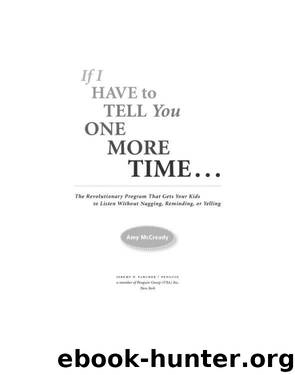If I Have to Tell You One More Time. . . by Amy McCready

Author:Amy McCready
Language: eng
Format: epub, mobi
Publisher: Penguin Publishing Group
Published: 2011-06-21T04:00:00+00:00
TOOLBOX SOLUTION # 9
Make When-Then Routines the Boss
The Tool Explained
You’ve heard it before: Set a routine for your kids. If you think your current routines could use a tune-up, and especially if you’re having trouble getting your kids ready to go in the morning or sending them to bed, I strongly encourage you to give When-Then Routines a shot. I call my version the When-Then Routine because it follows the same format as the When-Then in tool #8. When your kids complete the items in the routine, then they get to enjoy a normally occurring privilege. Follow a routine consistently, and soon it’ll have your house running much more smoothly—routines really work!
When-Then Routines are a method of controlling your children’s environment, and they’ll cut back substantially on the nagging and reminding you may find yourself doing on a daily basis. They can be particularly helpful in the morning, after school, at bedtime and during other potentially volatile times of the day.
When you establish a routine, it’s key to make sure the last thing on the list is the most desirable action. For instance, your kids’ morning routine could include non-negotiables like making their beds, getting dressed, washing up and putting backpacks and lunchboxes by the door. Finally, once everything else is done, they can come to the table for breakfast. This assumes that your kids are eager to eat, so if they’re not, you can allow morning playtime, or ten minutes of TV time within your routine, once everything else is completed and before it’s time to leave for school. Both of these are normally occurring privileges for a child ready ahead of schedule, and not special rewards.
Routines work best when you set them up as a When-Then situation (see tool #8). So when all your kids’ tasks are finished in the morning, then they are welcome to eat breakfast in the time remaining before the bus leaves. Yes, your kids may go to school hungry if they don’t get everything done—but rest assured this will happen only once.
To develop this type of routine, begin by writing a list of the non-negotiables, or the things that must be done. This is your “when.” Then create a desirable action to happen as the last thing—your “then”—and place a deadline (the school bus arriving, or bedtime) if appropriate. Make sure you present the routine to your kids in this format.
I encourage you to solicit your older kids’ input into their routine. A 13-year-old can decide for herself whether she wants to shower in the morning or in the evening, for instance, and a 10-year-old can choose in which order to do homework and family contributions. By asking your kids’ preferences, you also get buy-in for the routine, and your kids are less likely to feel overpowered by their parents.
Many parents wonder if rewards come into play as the last item in the routine, but as we discussed in the When-Then tool, they don’t. The desirable action should be something that would happen anyway, not a special treat.
Download
If I Have to Tell You One More Time. . . by Amy McCready.mobi
This site does not store any files on its server. We only index and link to content provided by other sites. Please contact the content providers to delete copyright contents if any and email us, we'll remove relevant links or contents immediately.
The Lost Art of Listening by Michael P. Nichols(7476)
Rich Dad Poor Dad by Robert T. Kiyosaki(6575)
We Need to Talk by Celeste Headlee(5596)
I Love You But I Don't Trust You by Mira Kirshenbaum(3855)
The Complete Idiot's Guide to Coping With Difficult People by Arlene Uhl(3135)
Rich Dad Poor Dad: What The Rich Teach Their Kids About Money - That The Poor And Middle Class Do Not! by Robert T. Kiyosaki(2940)
A Burst of Light by Audre Lorde(2582)
The Book You Wish Your Parents Had Read (and Your Children Will Be Glad That You Did) by Philippa Perry(2501)
Dealing with People You Can't Stand by Dr. Rick Brinkman(2447)
Life Hacks by Dan Marshall(2442)
An Odyssey by Daniel Mendelsohn(2295)
The Expectant Father by Armin A. Brott & Jennifer Ash(2259)
Teach Your Child How to Think by Edward De Bono(2149)
No Time to Say Goodbye(2096)
What I Need by J. Daniels(2066)
The 7 Habits Of Highly Effective Teens by Covey Sean(2060)
The Out-of-Sync Child by Carol Stock Kranowitz(2034)
I Don't Belong to You by Keke Palmer(1978)
The Anxious Generation by Jonathan Haidt(1971)
